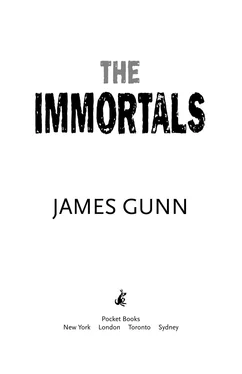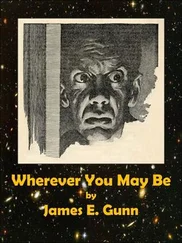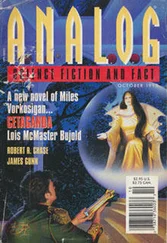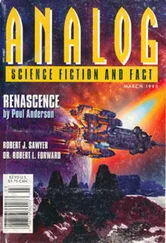It was a pretty grim business, Flowers thought, this presidency of the county medical society. No occasion for laughter.
No, that was wrong. One of them had worn a ghost of a smile, the vague possibility around the painted lips that they once had smiled, that they did not take this matter quite as seriously as the painter.
He had bent over, curiously, to read the name on the tarnished brass plate fastened to the bottom of the frame, but he had forgotten it. He bent again, in imagination, trying to read the memory engraved on his brain. He visualized it, getting closer, clearer. He read the name:
DR. RUSSELL PEARCE
President, 1972–1983
Russell Pearce—of course, how could he forget? Discoverer of elixir vitae, developer of the synthesis which bore his name, dying now of senescence in a rotting house in the middle of the city.
Dr. Russell Pearce—Russ—Leah’s father.
The door opened in front of them. Hesitantly Flowers stepped out into the hall. It was almost identical with the one below.
To the left were tall windows opening on a graying night. “Where are we?” Flowers asked fretfully.
“City Hall,” said the sergeant. “Come on.”
“What am I doing in City Hall? I’m not going anywhere until you answer my questions.”
“Hear that, Dan? He ain’t going anywhere. Ain’t that the truth? Go tell Coke we’re here.”
The other officer, big and sullen-faced, slipped through a pair of glass doors at the other end of the hall. The sergeant grinned and ostentatiously adjusted a pistol in the holster at his side.
That one, Flowers thought with a shudder, wouldn’t be loaded with anesthetic slivers. “You’ve got no right to keep me here against my will.”
“Who’s keeping you here against your will?” the sergeant asked, surprised. “You want to leave? Go. Of course, you gotta be careful about little accidents on the way, like tripping on the stairs. It’s a long way down.”
This degradation of the police power of the city paralyzed Flower’s will.
The wizened little man who came back with Dan peered at Flowers speculatively. “He’s just a medic,” he said petulantly, his bruised mouth curving down in disappointment.
“You expect us to be choosy?” the sergeant complained.
“Well,” Coke said timidly, “I hope it’s all right. Follow me.” He motioned to Flowers.
The medic compressed his lips defiantly. “No!”
The sergeant’s hand moved in a blur of speed. It hit Flowers’s face, palm open, with a solid, meaty sound. The room reeled; Flowers’s knees buckled. Anger burst over him redly, and he straightened, his arms ready for battle.
Dan stepped forward, grinning, and kicked him in the groin.
The pain blurred everything as Flowers lay curled on the floor, trying to get his breath. Gradually the pain ebbed, and his muscles relaxed enough to let his legs fall away from his belly. Flowers forced himself to his knees on the cold marble floor and struggled up. He found the sergeant’s arm around him, helping him stand.
“There now,” the officer said casually, “we’re going to be sensible, aren’t we?”
Flowers gritted his teeth and did not groan. He let himself be led through swinging glass doors into a large room bisected by a long, darkly polished counter. Against the right wall was a bench. On the bench was a thin, weasel-faced man.
The weasel face smirked at Flowers. Thyroid, Flowers thought dazedly. The shover. Free. Laughing. While he was held by the police, in agony.
By the time they reached the heavy walnut door in the right wall, Flowers could walk without crippling pain. “Where are we going?” he got out between clenched teeth.
“The Boss needs a doctor,” Coke said, trotting past him to open the door. Beyond was darkness. “It’s about time he should wake up.”
The Boss? “Who’s he?”
The gray little man stared at him incredulously. “John Bone!”
“Coke!” screamed a voice thinned with pain. “Coke! Where are you?”
“Here, Boss!” Coke said in a frightened voice. “Here with a medic!”
He scurried across the room to draw curtains away from tall windows. The smog-smeared light crept across the floor, onto the wide bed with its tumbled covers. A man was sitting upright among them. He was cadaverously thin, his face a blade, his arms and legs mere sticks.
“A medic!” he screamed. “Who wants a medic? I’m dying. I need a doctor!”
“This is all we could get,” Coke said as if he had been born cringing.
“Oh, all right,” Bone said. “He’ll have to do.” He swung his feet over the edge of the bed and fitted them into baby-blue mules. “Come on, Medic. Treat me!”
“Where’s your contract?” Flowers asked.
“Contract!” Bone screamed. “Who’s got a contract? If I had a contract, do you think I’d be hijacking medics?”
“No contract, no treatment.”
The hand hit him on the back of the neck like a club. Flowers sagged and almost fell. Distantly he heard his own voice saying, “That won’t do any good.”
When the blackness went away, he was sitting in a chair near the bed. He turned his head painfully. The policemen were standing behind him, one on each side. In the doorway the shover was lurking, watching eagerly. Coke was in front of him. Pacing back and forth between the chair and the window was Bone, his mules clacking against the marble floor and then clumping on the thick carpeting.
“I want treatment, Medic! Can’t you see I’m dying?”
“We’re all dying,” Flowers said.
Bone stopped and stared fiercely at Flowers. “Sure. But some of us can put it off longer if we’re smart. I’m smart. I want treatment. I can pay. Why shouldn’t I have treatment? Why should I be discriminated against? You think nobody ever got treatment who wasn’t entitled to it?”
“The only thing I know is that there are ethical standards and I’m bound to them. What difference does it make?” Flowers said defiantly. “You don’t need a doctor; you need a psychiatrist. The only disease you’ve got is hypochondria. Everybody knows that.”
Bone turned to stare at Flowers with dark unreadable eyes. “So,” he said softly. “A hypochondriac, am I? I am not dying, eh? Who is to say? These pains in my belly, they are imaginary? My head is sick? Well, maybe. Come here. I want to show you something.”
Flowers didn’t move quickly enough. A rough hand shoved him out of the chair, propelled him across the room. He stopped beside Bone in front of one of the tall windows. The dawn had come in earnest, and the city lay beneath them, gilded by the sun, the signs of decay hidden.
“Look!” Bone said, encompassing the city within the sweep of his arm. “My city! I am the last of a dying breed, the political boss. After me, the deluge. There will be no more city. It will fall apart. Isn’t that a sad thing?”
Flowers looked at the city, knowing its ruins, and thought it would be a very good thing if it were all destroyed by fire or flood, wiped off the earth just as medicine had wiped out smallpox, diphtheria, malaria, and a hundred other infectious diseases—only in a different way, of course.
“The City,” Bone mused. “It is a strange thing. It has a life of its own, a personality, emotions. I woo her. I rage at her, I beat her. But underneath it all there is love. She is dying, and there is no medicine to save her.” There were real tears in Bone’s eyes.
“I can’t help her,” Bone said softly, beating his fist gently against the paneled wall beside the window. “I can only weep. What has killed her? That cancer there upon the hill! The doctors have killed her. Medicine has killed her.”
Flowers looked where the skeletal finger pointed, toward the hill rising like an island of sunlight out of a sea of night. The reddish, slanting rays gleamed on the stout walls and sky-reaching towers of Hospital Hill.
Читать дальше












